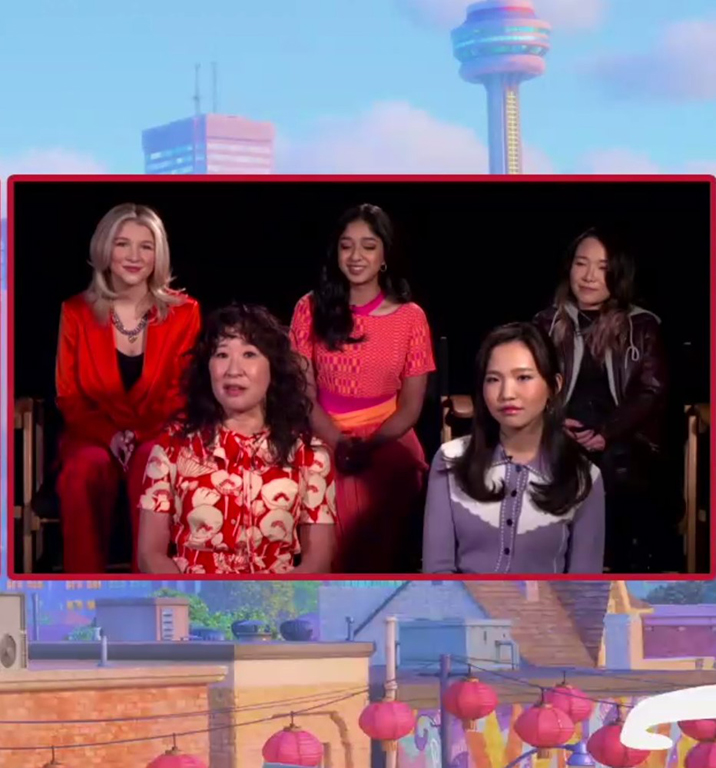By Kai Curry
Northwest Asian Weekly
 “Turning Red” is a movie of firsts, firsts that the main character, Meilin (Mei), goes through as she turns from being a child to a teen, and firsts that the movie-makers had the gumption to tell us about.
“Turning Red” is a movie of firsts, firsts that the main character, Meilin (Mei), goes through as she turns from being a child to a teen, and firsts that the movie-makers had the gumption to tell us about.
How many decent, honest films are there about teenage girls? We’ve had guys with pies (patently indecent) and we’ve had books (‘cause girls are bookish, right?) of the “Are you there, God?” variety.
But Disney and Pixar’s “Turning Red” strives to be real about being a girl on the big screen—and has fun doing it.
Plug your ears if you need to because the first “first” is that girls have periods. Yeah. Not only are they inconvenient and scary—girls rarely have “the talk” that’s given to boys—but there is the added injustice of being ostracized for a natural bodily function. It’s never explicitly said that Mei is having her period, yet the symbolism is hard to overlook. There’s a funny scene at the start when Mei has locked herself away and her parents are frantic—“It’s too early!”
Modern folks are often not ready for this completely expected rite of female passage. And poor Mei—or is it lucky Mei?—has the added complication of turning into a red panda.
Does she morph into a red panda in substitution for that “time of the month?” Well, it’s complicated, right? Because being a 13-year-old girl is complicated. All of the sudden, there are also “messy” emotions—anger, frustration, sexual awakening—which cause the red panda to appear. And all of the sudden, there are conflicts with parents, especially for the mom, because prior to this, her child was obedient and seen-not-heard.
“Turning Red” is honest and humorous about all of these complications and uses the phenomenon of becoming the red panda to illustrate what teenage girls go through as they try to figure themselves out in relation to the world around them.
“In this movie, she goes through these huge changes, and she’s dealing with this,” explained Rosalie Chiang, who voices Mei. “But at the same time, she has all these things in her life, but she doesn’t want to lose herself.”

The female voices of “Turning Red,” a screenshot from their virtual press tour: (bottom, from left) Sandra Oh, Rosalie Chiang; (top, from left) Hyein Park, Maitreyi Ramakrishnan, and Ava Morse.
Sandra Oh, who voices Mei’s mom, acknowledged that this stage of life is “tough” on moms, yet is a normal part of growing up. “I play Ming…who is, I’d like to call her, a hypervigilant, loving mother … we basically go through … a natural change between mothers and daughters when daughters have to become their own independent people.”
“Turning Red” takes full advantage of visual effects to put its message across. A unique and successful collaboration between the two studios, the movie adheres to director and writer Domee Shi’s vision of what it’s like to see through the eyes of a 13-year-old girl.
Set in Canada, from where the majority of the cast hails, the movie claims another ‘first’ by combining Pixar’s house animation style with anime, and what has come to be called a chubby-cute aesthetic. Nods to anime are found throughout the film, such as characters going starry-eyed or through other exaggerated facial expressions. Meanwhile, the world created is completely an immersive version of the city of Toronto, down to locals being able to recognize street corners and identify buildings.
“I’m Canadian, and I’m Asian, so I completely relate to this movie,” said animator Benjamin Su, who felt the “diversity aspect” of “Turning Red”—cast and crew—was “very important.”
Fellow animator Bruce Kuei was excited about combining styles because “growing up, that was all the cartoons I watched … anime from the 80s and 90s.”
Both animators drew from their own youths, as well as their experience as fathers of teenagers, to imbue the work with authenticity.
As part of channeling a 13-year-old girl, animators were given the task of being the first to create an animated boy band in a movie. Mei and her friends are ga-ga over 4Town (the running joke is, why are they called 4Town when there are five of them?). The girls demonstrate remarkable business acumen raising money to attend a concert, while falling over themselves in typical teenage mania for the young boys in the band.
Maitreyi Ramakrishnan, who voices Mei’s friend Priya, described going to a boy-band-type concert herself: “I was always wondering, why do people cry…? Like, shouldn’t you be excited to be there? … But then, as soon as they came out on stage—bawling. I was done … I was like, I understand … Music, growing up, totally shaped who you are. But also, enjoying that with your friends … specifically, female friendship.”
The friendship of the girls in the film is another first—they’re not mean girls; they’re not out to get each other. Instead, the friendship is vital to Mei coming out of her struggles whole and happy. They are her support network.
“What I love about this film, through friendship and also music—it’s that precious time when you’re starting to figure out who you are, when your friends become really, really important,” said Oh, who still has female friends she grew up with.
“It’s kind of a beautiful thing,” continued Ava Morse, who voices Mei’s volatile friend Miriam. “Everybody’s in that together … living their lives the best they can. … All of my friends mean so much to me. They’re all very supportive no matter what.”
The amount of collaboration in the film feels like another first—from the way the friends work together in the story to the way the movie-makers and two studios worked together. Representation is definitely a part of it—of women and of the diversity of the cast and production team.
There is also representation of so many age groups, and of people from so many different walks of life who came together in a single vision to create the movie. Songs were written by Billie Eilish and her brother, Finneas O’Connell (who voices one of the members of 4*Town).
Producer Lindsey Collins explained the musical choice: “I have three teens at home, and they’re listening to music constantly. Billie and Finneas’s music was being played all the time in my house. They were clearly people who were speaking to this generation, and … they felt like … those songs … were written for them.”
She retold how the filmmakers worried it was such a “weird ask,” yet Eilish and O’Connell agreed at once. “It was huge. It was like a gift, really,” she said.
There is something about “Turning Red” that everyone can relate to. No matter what gender we are, we all must decide at some point if we are going to keep our “messy” emotions sublimated, if we are going to own who we are, or if we are going to “turn red.” The trick is that somewhere in there is a healthy combination of all three, and that’s what Mei has to figure out, for the first time.
“Turning Red” releases March 11.
Kai can be reached at info@nwasianweekly.com.



